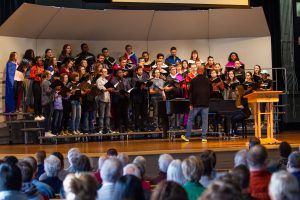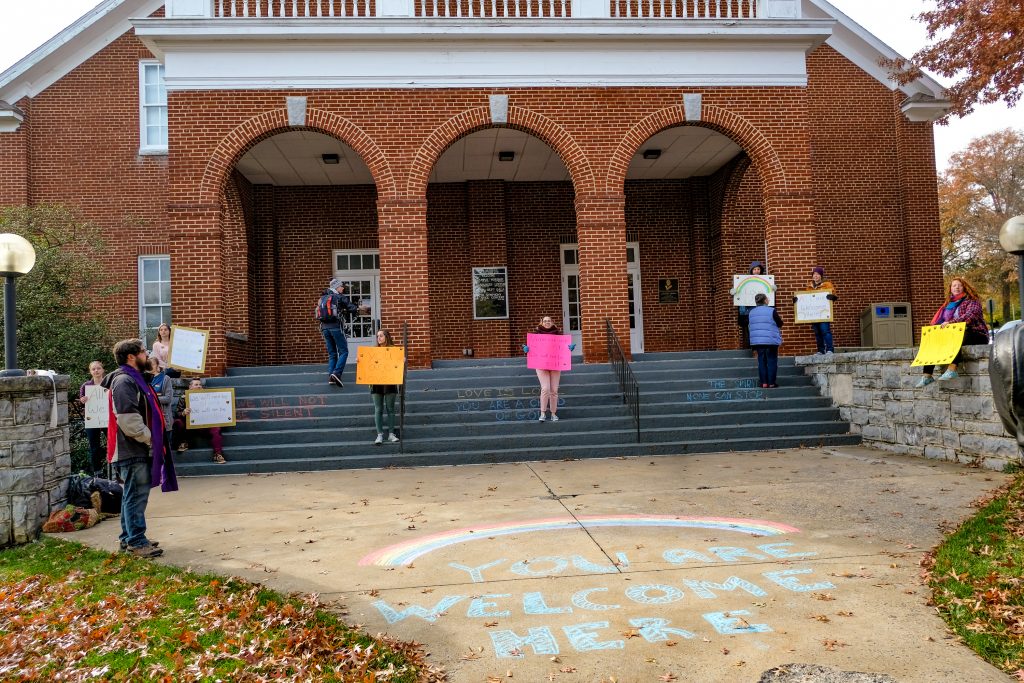A group of Eastern Mennonite University students gathered outside of Lehman Auditorium before and after a November campus worship service featuring visiting theologian N.T. Wright to draw attention to his refusal to meet with them.
Their mouths covered with rainbow duct tape, approximately 18 members and allies of Safe Space – a support group for the LGBTQ community on campus – stood after the service with arms linked in a silent, outward-facing circle, while other students nearby displayed rainbow flags.

Emily Powell, a senior who co-leads Safe Space, said members of the group first became concerned about Wright’s visit to campus after learning in late August of “derogatory and dehumanizing” comments made by him about the LGBTQ community.
“We hoped to make a statement about hearing queer voices on campus,” said Safe Space co-leader Abigail Shumaker. “I really hope increasing Safe Space’s visibility on campus will be able to lead our whole community at EMU in a positive direction. … EMU is stronger when we all stand together.”
Wright came to Harrisonburg for a two-day, five-lecture series that drew widespread interest. A pastors’ breakfast was attended by 140 area church leaders, and later audiences filled James Madison University’s Memorial Hall and Eastern Mennonite Seminary’s Martin Chapel.
Currently the research professor of New Testament and early Christianity at the University of St. Andrews in Scotland, Wright has also been Bishop of Durham and a professor of New Testament studies at Cambridge, McGill and Oxford universities.
His visit was sponsored by the Missional Church Partnership coalition, the Augsburger Lecture Series and Aubrey Spears, rector at the Church of the Incarnation and Café Veritas.
Safe Space communicated through Campus Pastor Brian Martin Burkholder an invitation for conversation with Wright, but Wright declined meeting to discuss issues of sexuality.
Powell said she would have liked to ask Wright the same question she has asked others: “How did they rationalize the radical love and inclusion that Jesus taught directly with the hatred and discrimination that modern Christian politics uphold?”
Wright’s refusal was concerning to a number of faculty, including Professor Deanna Durham, who serves as Safe Space faculty adviser.
“We talk a lot about academic freedom and the importance of people talking across difference,” Durham said, “and so we have someone who comes to campus who says, ‘I won’t do that.’ From an academic point of view, it’s a real missed opportunity. We have expertise on dialogue and facilitation at EMU and I think we could have had a very productive conversation more broadly about the church and how we work at inclusion, not just LGBTQ inclusion but beyond that as well. It’s the work of the academy – to talk about things and to model that even when we hold differences about what it means to follow Jesus, we can sit together around a table. It helps us humanize one another.”
In the months leading up to Wright’s visit, numerous formal meetings and discussions occurred, including when President Susan Schultz Huxman and Vice President for Student Life Jim Smucker hosted members and allies of Safe Space in a listening session.
Safe Space invited the Augsburger Lecture Series committee, members of the convocation committee, and queer students and their allies to join a circle process about Wright’s visit.
“We got a lot of good work done, with a good amount of tears and a lot of honesty,” Powell said of the two-hour process. “… I don’t feel quite as attacked as I did when I first learned that Wright was coming here.” Instead, she said, she more feels “like I’m a part of this community and not something that is divisive just in terms of my identity.”
“We know that the [organizers of Wright’s visit] did not have intentions of seeing this harm in the community, but that does not mean the harm is not there,” said a Safe Space flier made available at the protest. “We have been heard by some, but our hearts still ache.”
As during other campus worship gatherings, alternative worship sessions were offered, including “Queer and Christian: A Staff Faith Story.” Other Safe Space events planned during the week included a viewing of the documentary Believer and a time of hearing stories from the LGBTQ community.
Outside Lehman Auditorium, the response to the protesters was “overwhelmingly good,” Powell said, with some people making eye contact, nodding, or saying “I’m with you.” The response of two women in particular stood out to her: “They went around the circle and hugged every single person, and at the very end said, ‘You’re loved. I see you,’” she said. “I almost lost it at that point.”
Not all campus worship attenders were supportive of the protestors. One who repeatedly addressed the protesters was diverted by an affiliate in campus ministries and faculty members.
In the 24 hours following the Safe Space action, several of the chalk messages the group had written on campus sidewalks for the protest were changed.
In a campus-wide email, Huxman identified the changes as hate speech.
“EMU is committed to creating an open, safe and inclusive community for all, regardless of race, ethnicity, sexual orientation, gender identity, and/or gender expression,” she wrote. “Today, we stand with all in our EMU community who identify as and/or advocate for the LGBTQ community. We are renewed in our commitment to support practices that foster respect and dignity for every person on our own campus as we are called ‘to do justice, love mercy, and walk humbly with God.’”

This article touts EMU’s expertise in “dialogue and facilitation.” Yet the question posed to Wright effectively tars and feathers him with “hatred and discrimination” as the starting point for dialogue. What theory of dialogue licenses such a defamatory approach?
Safe Space essentially asks how Wright could reconcile himself to being an evildoer. Why should Wright, or anyone, respond to such a set-up question?
I’d like to see Wright’s “derogatory and dehumanizing” comments for myself, please. This article calls into question EMU’s judgment — not simply about Christianity, which would be bad enough, but also about its own touted expertise in dialogue facilitation.
“It is not using Romans 1 as a prooftext, but as part of the tightly woven fabric of Paul’s greatest letter, to say that he certainly regards same-sex genital behaviour as dehumanized and dehumanizing.”
“As the Lambeth voting figures made clear, there must be many first-world bishops on both sides of the Atlantic who are not hard line right-wingers, who are not ‘the usual suspects’ on every political issue that comes up, but who are heartland Episcopalians who know in their bones that the gay agenda is leading in the wrong direction and will quietly oppose it.”
“and Paul clearly sees homosexual behaviour as ultimately a form of human deconstruction.”
-From a speech NT Wright made and has posted on his website here: http://ntwrightpage.com/2016/07/12/communion-and-koinonia-pauline-reflections-on-tolerance-and-boundaries/